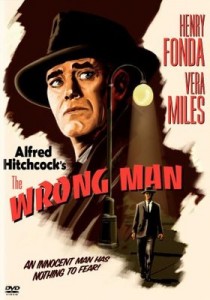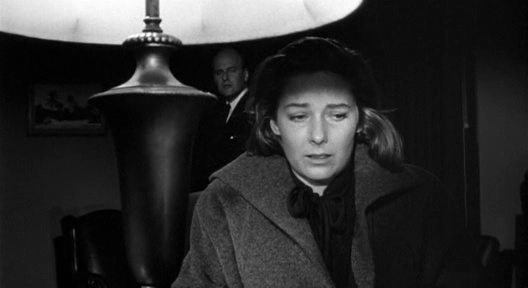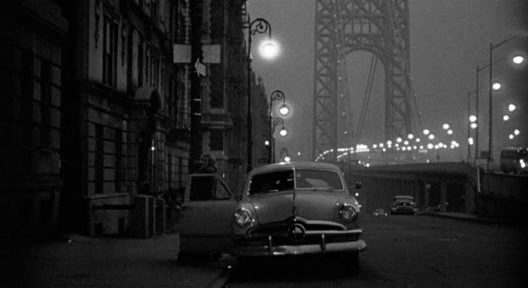Wrong Man, The (1956)
“An innocent man has nothing to fear — remember that.”
|
Synopsis: |
|
Genres, Themes, Actors, and Directors:
Response to Peary’s Review: Fonda is well-cast in the title role; he’s the ideal “everyman”, an “initially dull Hitchcockian hero whose every minute is planned out and whose life doesn’t vary at all from day to day” — and a rare Hitchcockian protagonist “without any sense of humor” whatsoever. Miles provides a nuanced, sensitive portrayal as his increasingly disturbed wife, and the supporting performances throughout the film — many by seemingly unknown actors — are finely rendered; note, for instance, the utter believability of the three terrified women in the Social Security office who initially accuse Fonda’s character. Meanwhile, Robert Burks’s stark cinematography perfectly captures the nightmarish noir milieu within which Fonda and his family find themselves, and fine use is made of authentic New York City locales. With all that said, I must now admit to postponing my revisit of this highly regarded Hitchcock title for as long as possible; as DVD Savant puts it, “There’s nothing wrong with this picture except that it breaks Hitchcock’s primary rule – it doesn’t please the audience.” Hitchcock’s fidelity to the real-life story he was telling results in an oddly depressing and disturbing viewing experience; while The Wrong Man is undeniably a masterful film on many levels, it’s one which most film fanatics will probably want to consider a “once and done” title. At the very least, any viewer will come away with a heightened understanding of the importance of never, ever providing information to the police without first consulting a lawyer; Fonda’s best intentions here (giving lie to the oft-repeated quote that “an innocent man has nothing to fear”) do nothing but get him even deeper into trouble. Redeeming Qualities and Moments:
Must See? Categories
(Listed in 1001 Movies You Must See Before You Die) Links: |





One thought on “Wrong Man, The (1956)”
A must.
I had a somewhat different reaction from the one detailed in the review. Until now, it had been quite a long time since I had seen ‘TWM’. It’s possible that, before, I was still young enough to not really consider how – in a certain circumstance – one’s life could spiral down through no personal fault. Being older now and seeing the film again, obviously I know a lot more about life – so this time around I found the film that much more compelling. We are always a lot more vulnerable than we think.
Oddly, this may now be a personal favorite of mine among Hitch’s work. Precisely because it is such a departure for him, so unique and straightforward (or perhaps I should say ‘in your face’). And I suppose because it proves once again that truth remains much stranger than fiction.
I certainly noticed a lot more in the film on a revisit. The household Fonda heads is a rather happy one – the husband and wife are clearly in love and they (esp. Fonda) seem to have a way with their two sons. They all seem to lead a quiet, private life as a family. (Fonda even seems a bit out-of-place in his job at The Stork Club. Granted, musicians are often loner types but, since his character doesn’t drink and is not much of a social butterfly, one wonders how much enjoyment he gets from playing music in public. The milieu of the club seems foreign to him.) The seemingly removed existence of the family is what makes the main action of the story all the more intense: the reality of the harsh world comes crashing in on a very protected space, smearing it and turning it upside-down.
As is known here, I too often find Fonda a cold actor but here he works marvelously, almost as if he’s been asked to strip naked to be rid of all pretense. I believe every second of his performance. Miles has the trickier role but, if you pay attention to her in the earlier part of the film, it’s not that hard to buy into her descent into ‘madness’; she already was a bit fragile. Overall, Hitch does fine work with and gets very precise work from the entire cast, down to the smallest of roles.
In a number of ways, ‘TWM’ has a pronounced ’50s sensibility but, even so, the sustained urgency of the film prevents it from seeming at all dated.
Though I’ve said, as many have, that ‘TWM’ is unlike any other Hitch film, quite a bit of it is still pure Hitch at his finest. Yes, this is one I’ve been away from a long time – but I don’t know that it will be all that long before another visit. There really is quite enough going on here to merit multiple viewings.